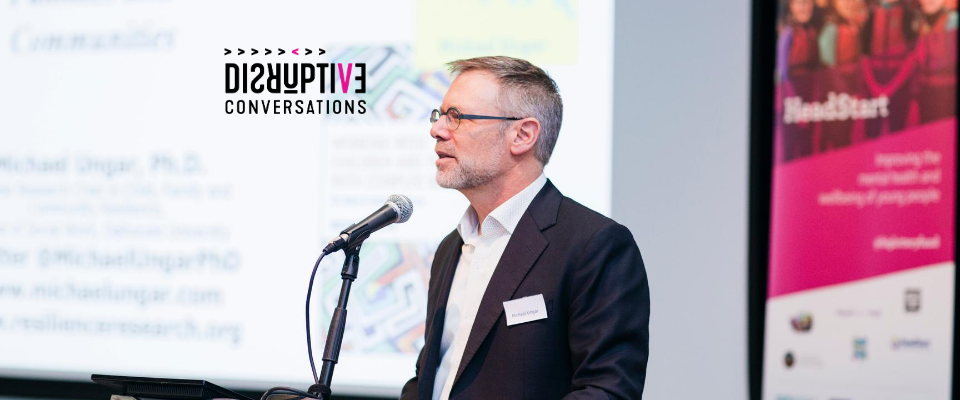Michael Unger is a professor of social work and is currently the Canada Research Chair in Child, Family and Community Resilience at Dalhousie University in Halifax, Canada. Although he began his career as a family therapist, today he is a researcher and looks at resilience in populations that under stress. He works around the world to try to understand how social and environmental factors help to foster innovation.
Below are some of the things that stood out for me in this episode.
What makes someone successful?
When you as people this question directly, they usually attribute it to something related to their mindset or grit. Their own self-determination. What Michael and other researchers have discovered is that if you study what makes people successful, access to resources and being in a supportive environment significantly contributes to their success, yet people tend to either understate or credit their success to more internal factors. In the podcast, he talks about interviewing Renaldo (I am assuming CR7 I forgot to ask) and learning that despite Renaldo’s tendency to attribute his success to notions like having a positive mindset his research demonstrates that the world around contributes to your success. See episode 70 with Kate Sutherland for more insights.
Asking a different question.
Many years ago, Michael began to ask a slightly different question that focuses on how a resourced life contributes to success. This reframe has given him tremendous insight into helping us think about and understand how we build resilience. For him, he heard one too many stories in which one sibling was successful, and the other was not. Often the children would attribute the difference being that the successful child had skills or interests that the environment supported. This led Michael to focus on social and environmental factors that contribute to resilience.
The miseducation of mindfulness.
This is not going to be a popular conclusion, but Michael’s research that most mindfulness programs are successful in the short run but less successful in the long term. Additionally, what he is really pointing to is a straightforward idea. If your environment is not supportive, no amount of mindfulness is going to help you become successful.
An interesting implication
If Michael’s research is correct, then our entire culture of rugged individualism is put into question. This idea that we determine our destiny versus things that external to us profoundly challenges many of our long-held beliefs.
Differential Impact
There is a research concept called “differential susceptibility”. The idea is that in genetics determine how susceptible we are to a variety of things like addictions, disease, stress etc… what if we thought about that a little differently and thought about “differential impact”. What this refers to is the idea that the same program can have a different impact on different people. For example, a program that focuses on adult mentors with people who have experienced sexual abuse may have an undesirable effect on participants. That same program, however, could have a desirable impact on people who have been physically or emotionally abused. It is very similar to the idea that there is no silver bullet from episode 42 with Amanda Hache
We need to stop blaming the individual
Michael has found that when we blame people for the situation, they are in, often if we change the environment, it can make a significant difference. We need to stop blaming people and start looking at systems. Sarah Kaplan makes a similar point in episode 85.
Bounce back, adapt or transform
I learned from a mentor, Brenda Zimmerman that systems tend to bounce back. Often when we speak of resilience, we talk about returning to how things were. What if we instead looked at three types of change, incremental, adaptive and transformative change. These are all very different kinds of outcome to the change. Admittedly, Michael does not talk about incremental change, yet these four categories can help think about change. Michael gives an example, so instead of asking employees to meditate and do yoga, you make the work less stressful. You transform the environment to change the individual. For example, if you want to improve children’s education, you don’t focus on the children, you focus on the teachers. You resource the teachers, and they will take care of the children.
The influence of a compelling story
“We are not this kind of people who allow three-year-olds to die on beaches.” Many of us remember the photo of Alan Kudri. The Syrian boy whose body washed onshore in Turkey. I will never forget the image of the red shirt and blue pants. This story galvanized the world around the Syrian refugee crisis. Similarly, so to how the video of George Floyd catalyzed the world around Black Lives Matter. In research, N usually refers to the sample size, and when we can tell a story of one person and the difference we make, it can catalyze people to act. In the episode, Michael talks about the photo of Alan Kurdi influenced the Canadian elections. One party was proposing a prolonged approach to allowing Syrian refugees into Canada while another party was suggesting much larger numbers and a faster rate of immigration. When that photo was released, it tapped into the psyche of the country, “we are not this kind of people who allow three-year-olds to die on beaches.” As a result, the party that had much more favorable policies to Syrian refugees was the party that was thrust into power.
To learn more about Michael work visit: https://www.michaelungar.com/
